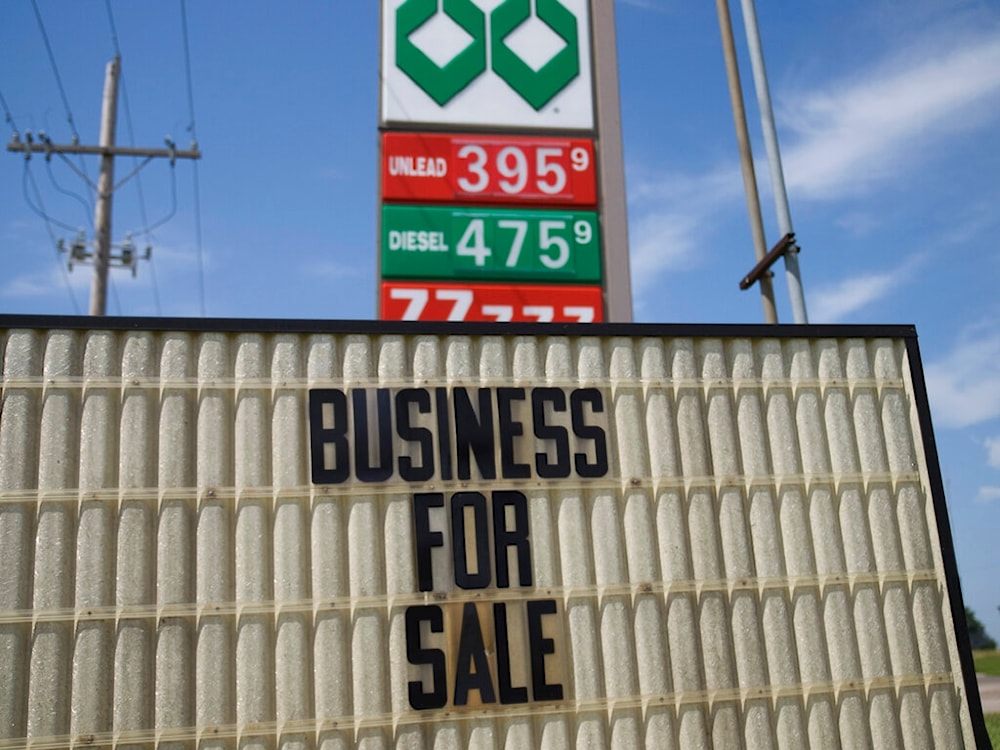US corporate loan delinquencies hit 8-year high: FT
At the end of 2024, corporate borrowers were behind on more than $28 billion in bank loans, an increase of $2.2 billion in the final quarter and $5.4 billion over the past year.
-

A 'Business for sale' sign outside a convenience store tells the story of how high gas prices are effecting many small business owners across the country in Meriden, Kan., Wednesday July 2, 2008 (AP Photo/Chuck France)
The Financial Times on Monday reported that corporate loan delinquencies in the US have reached their highest level in nearly eight years, raising concerns among credit analysts about the potential impact of tariffs on corporate finances.
Despite a stable economy and continued consumer spending, businesses are struggling with persistently high interest rates. Unlike other types of debt, corporate bank loans typically have variable interest rates, which fluctuate in response to market changes.
At the end of 2024, corporate borrowers were behind on more than $28 billion in bank loans, an increase of $2.2 billion in the final quarter and $5.4 billion over the past year, according to regulatory data compiled by BankRegData. This figure does not account for loans from private credit funds and direct lenders, which have become a growing part of corporate financing.
The delinquency rate for corporate loans from US banks, including those issued to foreign companies, rose to 1.3% by year-end—the highest since early 2017. Meanwhile, corporate borrowing declined by $100 billion in the fourth quarter, though part of this drop stemmed from regulatory adjustments redefining certain types of loans.
Read more: US corporate bankruptcies hit 14-year high amid inflation, weak demand
Concerns Over Interest Rates and Inflation
Many businesses had expected relief from lower interest rates in 2024 after inflation slowed last year. However, recent data showed inflation stalled, with consumer prices rising by 3% in January, largely due to higher food costs. Economists now warn that new tariffs introduced by former President Trump could reignite inflation or, at the very least, delay any rate cuts by the Federal Reserve.
"Mid-size companies are going to struggle in a higher for longer environment," said David Hamilton, head of research and analytics at Moody's. "Large companies are doing fine, but there are a growing number of small and midsized companies that the economy is not providing enough help."
Banks Remain Cautious but Optimistic
Despite the rise in corporate delinquencies, banks have not yet signaled alarm. Bank of America's chief executive, Brian Moynihan, addressed the issue during the company's recent earnings call, stating: "We're the largest lender to small businesses. Those customers tell us they are optimistic."
Corporate credit had been relatively stable post-pandemic, even as other forms of debt—such as auto loans and commercial real estate lending—began to see rising default rates. Corporate loan delinquencies only started increasing in late 2023. While the current rate remains far below the 5% level recorded during the 2008 financial crisis, analysts believe corporate borrowers will face mounting challenges in the coming months.
Read more: Trump's tariffs turn US into 'scary place to invest,' economist says
The biggest looming threat, analysts warn, is the long-term effect of tariffs. Larger corporations may have the financial flexibility to adapt to changes in trade policy, but smaller and mid-sized firms face a tougher road ahead.
"Tariffs, if they endure long enough, are going to inflict an enormous economic cost on small and mid-sized businesses," Hamilton said.
With borrowing costs remaining high and economic pressures intensifying, experts anticipate continued financial strain for businesses, particularly those without the capital reserves to withstand prolonged disruptions.

 3 Min Read
3 Min Read










